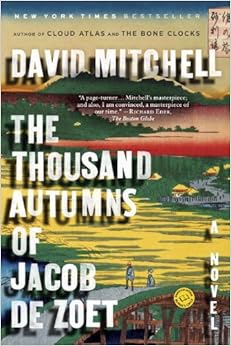
*Major Spoilers Below*
I really wish I'd read this before I read The Bone Clocks. Although it did give me different perspective on this book than if I'd done it in the order in which they were published. If I'd read this first, I'd have much of the backstory for the war that's going on under our noses in The Bone Clocks. However, having read The Bone Clocks first, I couldn't read this as a story about a crazy cult whose horrifying secret for immortality couldn't possibly work. I knew it did work. Which makes it even worse to read. or does it? Is it worse that innocents are killed for naught, or for something?
Without reading the later book, it would be perfectly possible to dismiss the outlandish claims. It could just be the tale of Dutch colonial authorities in Japan, struggling to maintain a position in a country determined not to let them in. It is the story of Jacob de Zoet, an honest man determined to prove his worth to the father of his betrothed by embarking on a trade mission.
He runs into corruption on both sides, Dutch and Japanese, men who are motivated by personal gain at the cost of national loyalty. He meets a doctor who cares little for official party lines. (Dr. Marinus, who David Mitchell readers will meet again in other fictional worlds.) One of his students is Orito, a Japanese midwife, with a burn across her face.
de Zoet falls desperately in love with her, and when she is sold to pay off her father's debts to a nunnery deep in Japan where Europeans are absolutely forbidden to go, he fails to offer his protection in a timely enough manner to save her.
The Japanese man he asks to intervene turns out to have been in love with her as well, but his family disapproved of the marriage. Yet one of the things that impressed me most about this book is how it is not, in the end, about love. Absolutely, several of the characters have strong feelings for each other. But they are not the most important thing in the world. There are many considerations, and love is one among many, and not the most important.
Orito is taken to a nunnery, where she rebels against accepting her fate, unlike the other women there, who have been taken from much worse circumstances, for whom these living arrangements are an adequate substitute. There, the price for comfortable accommodations becomes horribly clear, the women mere pawns in a game of pregnancy and childbirth, with outcomes that are only slowly and horribly revealed.
It's always difficult to know what to make of an author writing about another culture. Particularly when they are divorced in time as well as in space. There is a tendency to exoticize, to see people of another culture and time as fundamentally alien. Or to see them as exactly like ourselves, just in funny clothes.
Without really knowing how accurate Mitchell's portrayal of Japanese and Dutch interaction in the 18th century is, it feels right. Which is not to say that he's gotten it all right, but it doesn't feel exotic, but neither does it ignore culture. It's a tricky balancing act, but the imaginative leap Mitchell has taken is an impressive one.
If you read this first, it could be seen as a straightforward historical fiction. If you read it after The Bone Clocks, the supernatural claims are recast in such a way that takes a leap into the supernatural. And that, after all, is what I love about David Mitchell, the way he unabashedly straddles genre, and the way his books intertwine with each other. It's quite a feat.
Just came upon this : http://lithub.com/the-ever-expanding-world-of-david-mitchell/
ReplyDelete(Warning: mild spoilers for Bone Clocks, Jacob de Zoet, and Black Swan Green)
Oh, cool. Thanks! (I also don't know why I didn't get a notification of this comment. *sigh*)
Delete